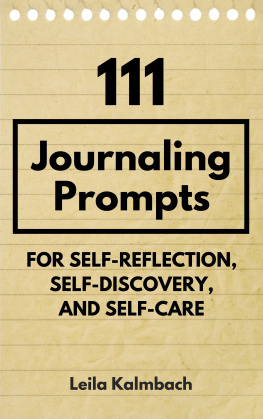ISBN: 978-1-4835587-3-8
Table of content
Introduction
Journaling is most powerful when you make it an essential part of your everyday life. You no longer have to think about it or struggle to make time for it; it is simply a ritual you do as naturally as taking a shower or making a cup of coffee first thing in the morning.
Building a regular journaling practice leads to tangible rewards in all aspects of your life. You release stress, emotional build-up and baggage that is holding you back. You overcome challenges, changes and hardships. You heal wounds, relationships and illnesses. You get insight into what you want and who you are. You clear a path to pursue a happier, healthier and more fulfilling life.
How to Build a Journaling Practice
Journaling is the best present you can give to yourself. So why does it seem so difficult to make it regular habit?
If you struggle with journaling regularly or you are new to the practice and not sure where to begin, you are not alone. The most common sentiment we hear in our community of journalers is, I want to make journaling a part of my day-to-day life, but Im having a hard time keeping it up.
This book is designed to help you overcome this common challenge. Over the next two weeks, you will create the foundation for a lasting journaling practice. Through daily reflections and exercises, you will explore a few of the many ways journal writing nourishes, supports and energizes you through constant motivation, renewal and inspiration.
This book is just the beginning of your journaling journey. Once you complete this 14-day challenge, you will have the confidence and passion to keep going.
Lets get started!
Day 1:
You Are a Journaler
You bought this book because you want to make journaling a part of your life. With this one simple action, you have taken the most important step toward creating a journaling practice: you decided to become a journaler. Congratulations, and welcome to the club!
With a little bit of practice and some words of encouragement from your Inner Coach, journaling will become not only a part of your daily routine but an important piece of your identity. Make it a priority to nurture your journaling habit and you will continue to see the benefits in your life over time.
Journaling Exercise #1
Spend a few quiet moments reflecting on your new identity as a journaler. What does this mean for you as an individual? How will journaling make you stronger, healthier and happier? How will it foster your focus, creativity and relaxation? How will it change you for the better?
At the top of a blank page, write, I am a journaler. Describe your journaling identity in detail, imagining all the ways writing every day will benefit you. How does journaling align with your health and wellness goals? Your professional and creative goals? Your personal development and relationship goals?
On the next page, write, My daily journaling practice is Describe each step of your new journaling ritual in detail. Where are you? What pen are you using? What time of day is it? How long do you spend writing? What happens in your schedule before and after you write? What emotions do you experience while you are journaling?
On a third page, write, I journal every day because Reaffirm the reasons you keep up your journaling habit. Write:
I feel
I can
I will
Day 2:
Building a Daily Habit
Journaling is a habit that gets stronger every time you do it. Like all habits, it requires you to spend more time and attention in the beginning as you are building a foundation.
If you learn to write a little bit every day, you will find your journaling rhythm and you wont have to think about it anymore. Writing will simply become a habit you maintain each day. And over time, youll see how journaling improves your mental clarity and your mood, and you will look forward to that daily reflection time.
Journal writing is very much like a physical fitness routine; you cant keep it up every now and then and expect great results. If you go running or do yoga once a month, you may feel frustrated each time you start up again. But if you do it daily, you will see your body get stronger and begin to transform.
In the same way, nurturing a daily writing habit gets you in peak form and allows you to discover all the benefits journaling has to offer.
Journaling Exercise #2
Do you have any reservations about creating a daily journaling practice? What worries you? What makes you feel resistant? What objections do you come up with? Is it your lack of time or energy? Are you reluctant to commit to anything else on your calendar? Are you rebellious against something that is obligatory?
Write down all of the reasons you can think of that you shouldnt or couldnt make journaling a daily habit. Be honest, and put them all down on paper.
Read your reasons and reflect on them objectively. What are you hearing from yourself? Can you identify any core ideas in your objections to a daily commitment? Analyze them, then write a short but thoughtful rebuttal. Explain why you can and will be able to journal every day. Address strategies for overcoming the obstacles you brought up. Come up with tricks for keeping yourself motivated.
Pick a tangible and achievable goal to kick-start your journaling practice. Set yourself up for success by making it so you cant fail. Set a goal of writing down three thoughts every morning when you wake up or journaling for two minutes after you brush your teeth at night.
Make it easy to attain, but promise yourself that you will stick to your resolution. Every day. No excuses, no loopholes. You can always write more than your set minimum every day (and you should if you are on a roll!), but at the very least, you can celebrate reaching your daily goal.
Imagine how you will feel each day once youve written in your journal. How will you give yourself a pat on the back? What will you do to celebrate? Will you make yourself a morning cup of tea? Will you read a chapter of your new mystery before you hit the hay? Jot down a few ideas for how to reward yourself in a healthy way after you reach your goal.
Day 3:
Find Your Journaling Style
There is no right or wrong way to journal, and your journaling practice is customizable to your needs and objectives. You may have one main motivation for wanting to start journaling such as dealing with stress or staying focused on career goals or many overlapping reasons.
As you begin to find your own journaling style, test out new ways of writing to see what clicks with you. Do you like having just one journal where you can write about anything, depending on the day? Do you prefer having several different journals that you separate by theme (for example, one for food and exercise, one for gratitude, one for emotional health)?
In todays journaling exercise, you will try a few different journaling approaches to get a taste of the possibilities. Keep an open mind, and see what gets you excited to write.
Journaling Exercise #3
For each of the following prompts, set a timer for 10 minutes. Start writing and keep your pen moving until the alarm sounds.














